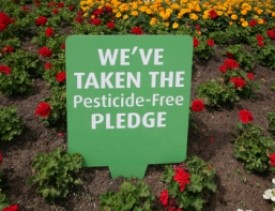Organic Vs. Conventional Gardening
 With organically grown food more popular than ever before, it's helpful to learn the difference between organic and conventional gardening. Basically, organic gardening differs from conventional methods of growing plants in that it does not use any synthetic additives. But there is much more to it than that. Let’s take a closer look at organic vs. conventional gardening.
With organically grown food more popular than ever before, it's helpful to learn the difference between organic and conventional gardening. Basically, organic gardening differs from conventional methods of growing plants in that it does not use any synthetic additives. But there is much more to it than that. Let’s take a closer look at organic vs. conventional gardening.
Advantages of Conventional Gardening
Conventional gardening methods typically require less time because the gardener uses chemical pesticides, weed-killers, and fertilizers to make the garden grow pest-free and weed-free. These chemical products are readily available and reasonably inexpensive. Applying the products is relatively quick and easy. Since conventional gardening practices are common, many gardeners can grow a garden with little training or education.
Dangers of Conventional Gardening
However, chemical garden additives can be harmful to human health, claims the Environmental Protection Agency (EPA), in addition to wreaking havoc on the environment. Insects and animals are also negatively impacted by the use of pesticides. Herbicides have been implicated as having harmful effects on human health, wildlife, and the environment.
Colony Collapse Disorder (CCD) is a term used to describe the sudden death and disappearance of up to 90% of some beekeepers' hives. Honeybees are an integral part of the world's food chain, and without them, some scientists project a devastating impact on the world food system. Some theories suggest that pesticide leads to the impairment of the bees' immune system, contributing to the decline in the bee population.
What is Organic Gardening?
According to Organic Gardening Magazine, "...organic gardeners don't use synthetic fertilizers or pesticides on their plants. But gardening organically is much more than what you don't do... An organic gardener strives to work in harmony with natural systems and to minimize and continually replenish any resources the garden consumes."
Advantages of Organic Gardening
Using natural products to add soil nutrients and control weeds may take more time, but the rewards are worth it. With so many potentially devastating implications of conventional gardening methods, organic gardening is easy by comparison. The best advantage is that you can feed organic produce to your family and pets knowing that nothing in the food is unhealthy and that it is free of harmful chemicals. Additionally, the environment, including honeybees, will not be negatively impacted.
Compost and Organic Gardening
Organic farming methods begin with the soil. Natural, nutritious compost (decomposed organic matter) is added to the soil instead of commercially available synthetic soil “improvers.” Organic gardeners may purchase readymade compost or opt to create their own by placing fruit and vegetable matter in a composting bin or receptacle. By doing the latter, they control the purity of their compost.
Compost is ready for use in the garden when it is dark brown and has a crumbly texture and sweet, earthy aroma. Work it into the existing soil to fertilize the plants and aerate the soil. Add it as a mulch to prevent weeds and hold moisture in the soil.
Learn How to Grow Organic
To grow an organic garden generally requires some effort to learn proper methods. It is more complicated than conventional gardening, where many problems can be solved simply by buying a bottle of pesticide or herbicide. This learning curve can discourage some would-be organic gardeners. But with a little time and determination, you can learn eco gardening basics. Read books and online articles, or attend a local class on organic gardening tips for beginners. For extra help, consult an expert who’s experienced in the field of organic gardening.
This article was updated November 19, 2017.
Looking for a Pro? Call us (866) 441-6648

Landscaping Average Costs
Landscapers Experiences

Don’t Be A Goober – Hire Qualified Pros For Safe Tree Removal

Yard Cleanup And Lawn Care Service With A Great Work Ethic



